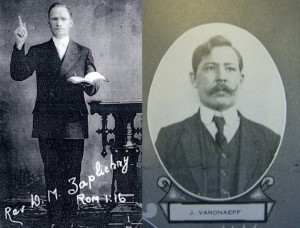90 Years of Bulgarian Pentecostalism
 Bulgarian Pentecostal believers celebrate 90 years of ministry and history. The Bulgarian Pentecostal movement is rooted in the Azusa street holiness Pentecostal revival which began in April of 1906. The revival then spread through the United States and less than a decade later, large Pentecostal denominations as the Church of God and the Assemblies of God were formed embracing the vision to send missionaries to foreign lands.
Bulgarian Pentecostal believers celebrate 90 years of ministry and history. The Bulgarian Pentecostal movement is rooted in the Azusa street holiness Pentecostal revival which began in April of 1906. The revival then spread through the United States and less than a decade later, large Pentecostal denominations as the Church of God and the Assemblies of God were formed embracing the vision to send missionaries to foreign lands.
After establishing contact with the World Missions Department of the Assemblies of God at the end of 1919, Cossack born immigrant, who later took on Ukrainian citizenship, Ivan Voronaev received a calling to return to his motherland and preach the message of Pentecost there. Alongside him traveled the family of Ukrainian immigrant Dionissey Zaplishny and his Bulgarian born wife Olga, who like Voronaev left the church they pastored in the United States to obey the call to missions.
On March 10, 1920, Assemblies of God issued Voronaev a certificate as a “pastor and evangelist in Bulgaria” valid till September 1, 1921 and on June 22, 1920 Voronaev notified them his plans to set sail for Russia with his family on July 13, 1920. On the said date, the Voronaev, Koltovitch and Zaplishny’s families set sail on the “Madonna” steamboat from New York to Constantinople. Along with them traveled a group of Kavkaz believers among which was Bulgarian Boris Klibok.
After arriving to Constantinople, they had to wait for visas to enter Russia. Voronaev immediately began meeting with the Russian community in town recognizing the lack of Russian Bibles and Pentecostal churches. He wrote on August 15, 1920: „ ….with the help of God opened Russian mission here [Constantinople], and God our work blessed;” and on August 30, 1920: „…. we had first baptism with water in river. I baptized one lady wife of a Russian office. Glory to Jesus!”
After waiting for three months in Constantinople, Voronaev arrived in the Bulgarian port city of Bourgas along with Bulgarian Boris Klibok. The Zaplishny family had already established their ministry there through Olga’s Congregational home church. What followed next was a revival that made history.
March 5, 1921: The Pentecostal Evangel published Voronaev’s report from Bulgaria where he has been holding Russian-Bulgarian revival services in various churches in the cities of Sliven, Yambol, Varna and Sofia. Seven received the baptism with the Holy Spirit.
April 16, 1921: The Pentecostal Evangel published Voronaev’s second report from Bulgaria about services in Sliven, Bourgas, Plovdiv and the Baptist Church in Stara Zagora where the daughter of the Baptist pastor from Kazanlak received the baptism with the Holy Spirit.
May 14, 1921: Services in the Congregational Church in Plovdiv and baptismal service in the Martiza River.
June 11, 1921: „In Bourgas, Bulgaria the Lord baptized with the Holy Spirit about fourteen souls. We have about twenty candidates for baptism with water, and about thousand Bulgarians and Russian were there and were much interested.”
July, 1921: The Latter Rain Evangel published an article under the title “Pentecost in Bulgaria” in which Voronaev wrote about new Pentecostal believers in seven Bulgarian cities, his relocation in Varna to work with the local Methodist church and his plan to move to Odessa. The Pentecostal Evangel from the same month wrote, “God called Brother J.W. Voronaeff, who had charge of a Russian Pentecostal Assembly in New York City, to Russia.”
The early Bulgarian Pentecostals spoke in other tongues, embraced the gifts of the Spirit, practiced foot washing and conservative holiness, and received the Bible as their rule of life almost to the point of ritualistic ascetism. It was their prayer, preaching and serving before the Lord that ensured the future of the movement. Many of them would be forced underground when the Pentecostal Union is registered with the Bulgarian State in 1928. Others will be persecuted even unto death during the Communist Regime after WWII. The more conservative group split right down the middle by two strong leaders, Tinchevists and Borisovtsi would protect the faith to the best of their abilities. Many modern religious formations, among which the Bulgarian Church of God, would spring out from these grassroots of these holiness seeking Pentecostal Puritans. By 1990, after the Berlin Wall had fallen, this group of people will go through the largest evangelistic revival in Bulgaria since the Christianization of Bulgaria in 861AD.








Comments